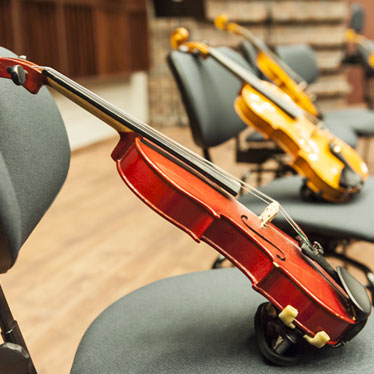Tips On How To Make Rehearsal Fun For Your Students

Just like practice, students can often find rehearsals to be a bit of a drag. It can be difficult for students to see the connection between today’s effort and tomorrow’s reward, when they can think of ten other things they could be doing right now that wouldn’t be so tough.
Yet with some additional creativity, you can find ways to increase the energy and motivation in the room. Here are a few suggestions:
Make today’s goal clear
It can be difficult for anyone, but especially younger students, to find the discipline to focus on the hard work for some later payoff they can’t see right now. Give them a goal they can achieve today, right now, in today’s rehearsal. It could be making progress on a particularly difficult section that needs extra work. It could be improving entries. Whatever makes sense for where your students are. Give them a goal they can feel good about achieving by the end of today’s rehearsal.
Break things up with a game or competition
Sometimes the challenge of a rehearsal is that it feels like every other rehearsal that came before. Sometimes you just need to get out of the rut. Games and competitions are a great way to change things up and get the kids laughing, all while making progress on some of the orchestras challenges. It’s like baking brownies with spinach or zucchini. They’ll never know it’s good for them. Here are a few game ideas:
- Improve how they hold their instruments by having them spot the mistakes. Have your students close their eyes while you set yourself up. You can hold a violin bow or oboe incorrectly, something obvious to start. When you’re ready, have the kids open their eyes and find your mistake.
- Encourage both note reading and team work by having each student play a single note (or bar) with the student next to them picking up right where they leave off. You can have fun “punishments” or rewards for students. You can make it a competition where the last student to make it through without missing a beat or misreading a note gets some big reward.
- Let the students set the bar for each other. Divide them into teams by instrument and they can challenge each other to “Play or Dare.” If a team chooses “Play,” they have to play a section of the piece you’re working on. Have a list of crazy dares ready for teams that choose that instead. Maybe it’s playing a passage in a different key, or slowing it down or speeding it up. Let different teams to pick what the other teams have to do to really make things salty.
Let students support each other
You can break up a typical rehearsal by having the kids pair up to work directly with each other. Sometimes you can pair up students in the same instrument family, or sometimes pair them up outside their instrument family to really expand their horizons. They can work on their note reading and develop their ear. You can set up games each pair can play on their own. For example, have one play the passage until making a pitch or rhythm error. It’s the partner’s job to identify and pick up right where the first student left off.
Get them moving
You know how sometimes the entire world looks different if you sit in a different spot on the train or bus? The same principle can work to help energize your rehearsal. You don’t need to switch the students’ seats around but do get them moving. You can have them stand up for the exercises or a run through. Or even have them walk around the rehearsal room as they play (for those who can). You can start the rehearsal with a simple yoga routine designed for musicians.
What games or tricks do you use to keep students engaged and motivated when rehearsal schedules seem to take their toll? Share your tips in the comments below so other teachers and students can benefit from them. Even the most dedicated young musicians need extra help from their teacher to stay focused.


